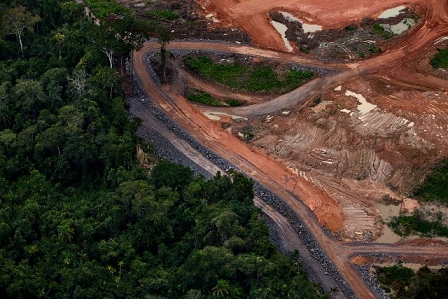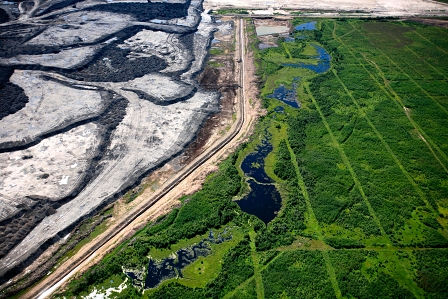Erstellt am: 22. 10. 2012 - 15:57 Uhr
Making Ecocide a "Crime Against Peace"
Imagine a world in which there are real consequences for destroying the environment. Rather than companies being hit by fines, as happened after the recent Gulf of Mexico oil spill, directors of companies involved in eco disasters would be tried by the International Criminal Court face prison sentences.

greenpeace
Das Elevate Festival 2012
von 24. - 28. 10 in Graz
Alles übers Elevate Festival auf FM4
That`s the vision of lawyer Polly Higgins, who will be speaking at the Elevate Festival in Graz. She wants the United Nations to accept "ecocide" as a fifth "crime against peace", alongside offenses such as genocide and war crimes.
“By creating a law of ecocide, business, banks and nations will be under a legal duty of care to ensure that profit, money and policy does not support mass damage and destruction of the earth by humanity,” she says.
Higgins insists that what the planet really needs is an effective deterrent against its rape and adopting ecocide into international law is the most effective way of achieving this because it would ensure that companies "make sure that they have proper safeguards in place from the outset or that they choose to get their energy from a different source."
Take deep-water drilling, for example. The practice is inherently risky, she says, and after the BP Deepwater Horizon spill, it appeared that the engineers had no real plan of how to replug to hole. They famously dithered for 7 full days. But if company directors knew that they might be criminally liable for any accidents that might happen, they`d either abandon the practice altogether or make absolutely sure that they knew how to react quickly and effectively to stem the damage if disaster did strike. "The new law would lead to pre-emptive action," she says.

greenpeace
She says the law would create a "duty of care for governments and corporations" and even says the law could be used to tackle man-made climate change. She cites the tar sands of Alberta in Canada as an example: "If you are causing mass destruction by razing a boreal forest and taking away one of the world`s most important carbon sinks that can be scientifically linked to excess greenhouse gases in the atmosphere."
Companies have often cut corners on environmental safety to save money and protect the profit-margins - the chemical leak at a Union Carbide factory in Bhopal, India that cost at least 4,000 people their lives and injured 600,000 is a prime example. This negligence has often taken place in collusion with local authorities. Higgins says prosecutors would look at the entire decision making process and pursue anyone who knowingly allowed such environmental destruction to take place.
Higgins hopes that the threat of being criminally prosecuted for contaminating soil and water would make the directors of oil, fracking or mining companies "recognise their responsibilities".
Ethically, she is surely right - for decades companies and their shareholders have profited by polluting without penalty, leaving future generations to pay the price in terms of poisoned rivers, biodiversity loss and rising temperatures.
But the law will surely be a hard sell politically.
Especially in these dire economic times, it is the politicians who promise to cut red tape who are rewarded at the ballot box. To expect politicians to deliberately make industry prohibitively expensive at a time of economic crisis seems like a pipe-dream.

greenpeace
"On the contrary", argues Higgins. "This is a law that will trigger the green economy." She says that providing adequate safeguards to protect the environment proved too costly, companies would realise that the wisest business decision would be to invest in clean technology. "It is a huge job creation scheme that will be effective across the world. It will promote the skilling up of people to create the innovations for a new direction, it will trigger investment in research into renewable technology and that means jobs."
Such a shift couldn’t take place overnight. Higgins speaks of a "transitional" period in which public funding – "bridging loans" - would help firms withdraw from "dinosaur" technologies and invest in a cleaner future. During this period "no prosecutions would be pursued whilst the companies change their practices."
Once again I find myself pulling my sceptical face. In the USA, President Barack Obama painted a vision of exactly such a tax-funded transition during his first election campaign, but his drive for green jobs has involved some embarrassing bankruptcies of publically subsidied green energy projects and he has gone a bit quiet on the topic. Voters seem more drawn to his challenger Mitt Romney`s staunch defence of traditional "dirty" extraction industries. But Higgins says that her international law would aid Obama by creating a level playing field. Polluting business couldn’t uproot and move elsewhere as they can when national environment laws are introduced - they would be held to account wherever they might go.

greenpeace
I can’t help it; having sat through the train-wreck of Copenhagen climate talks, I just can’t imagine the world`s governments co-operating with each other and defying the powerful industrial lobbies to agree to such a fundamental shift in the way we balance economic and environmental concerns. For example, Higgins hopes the law will make it too risky for the Russians to exploit Arctic gas reserves, so they will abandon this potential trillion-dollar natural resource and invest in wind energy instead. Canada will abandon its Alberta tar sands. And snowballs might survive in hell - I feel like adding.
But Higgins says there is a historic precedent for such a seismic shift in priorities - the end of slavery. 200 years ago William Wilberforce fought for its abolition of slavery in Britain saying it was morally wrong and had to stop. The industry argued that abolition would lead to economic collapse, claimed that the public demanded slaves and that basically the industry was a necessity. "But the government took the moral line and the predicted economic collapse never materialised. In fact, the 300 companies involved either directly or indirectly were supported financially by the government to innovate and move in a new direction. They flourished and the economy flourished under this new innovation."
It is time to take a brave step, she says.
(photos: Greenpeace)


